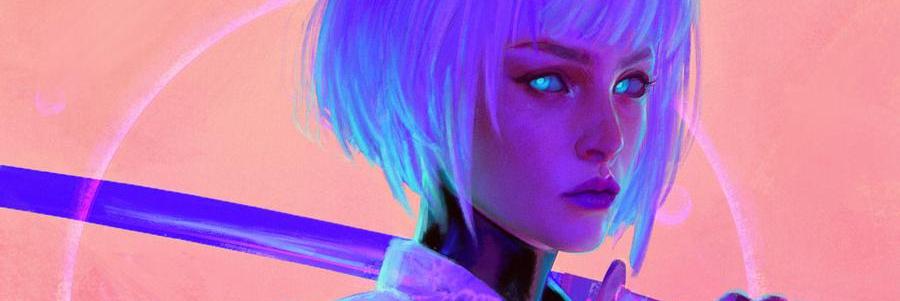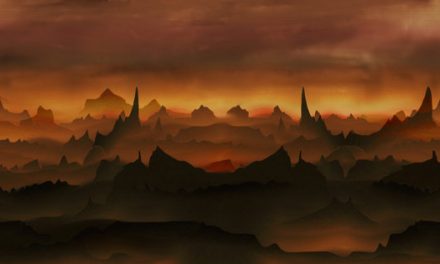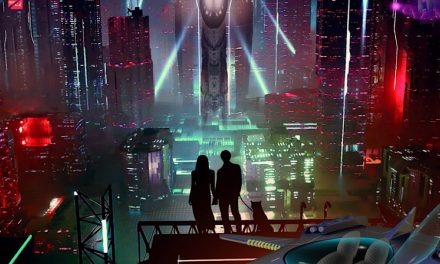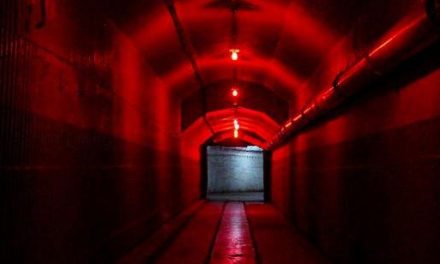It all made sense after a while—it almost felt natural, even—their arguments made sense, the speakers were charismatic, and she had an immediate family with whom she felt safe. They told her the reason her father died in the robbery wasn’t the lax gun laws or poor policing in the slums; it was because greenskins—orks and trolls—were just predisposed to violence. They didn’t understand culture or reason, and they struck out against their superiors.
Not that eves or dwarves we’re ultimately any better, she was taught. Elves sought to control humanity, each one of them using their secret associations to squeeze Homo sapiens sapiens out of the best jobs, the best opportunities. Dwarves were all cheats and con-artists. Sure, they could repair your car, but it was much more profitable for them to make sure it broke down again. And, like the elves, they were all in on it.
Immersed in the rolling sea of emotion at a clandestine local gathering—the elves owned the cops, after all, and would try to get their group disbanded, as if pride in one’s own race was only a positive attribute for non-humans—she felt connected in a way she never had before, hardly imagined before. A hundred humans, of all ages and backgrounds, were starting something. A movement that would sweep the earth.
She was told the stories about Alamos 20,000 and their struggle to maintain traditional values in the face of an increasingly organized ruling elite. How General Saito took back California from the metas with help from the Humanis Policlub. That everyone who wasn’t a part of their group was against them. She became convinced her old friends were secretly in league with her enemies, and that she could only trust the club.
She saw the group as a source of hope, of pride, and warmth, and was soon decked out in anti-metahuman tattoos and frequently parroted the negative rhetoric with which she had been indoctrinated. She lived, breathed, and slept in the festering pit of hate and anger for more than a year before the cold February night came that would change her life.
In an era where automatic vehicles and Johnny Cabs had become the norm, at least for the majority of the metroplex’s well-to-do, the concept of a “designated driver” for an evening of frivolity had been relegated to the annals of history. For the poor and destitute however, where the electric road grid was untrustworthy or had never been rolled out to begin with, vehicles powered by horribly-expensive petrol or good old foot power were the transportation options of choice.
Drinking at a local human-only watering hole, she and her friends were enamored by Ricky’s new toy—a shiny Cavalier Deputy heavy pistol, purchased third- or fourth-hand from friends of friends. The group was in good spirits, and the Old West-themed revolver made them feel like they finally had some control in their lives. They drank more to celebrate, though she cut herself off early—something about a posse of inebriated twentysomethings armed with an armed gun rubbed her the wrong way; the neighborhood had always been safe enough before.
Meandering through the rain- and grime-slicked streets, their spirits were high when they came across a destitute ork huddled against the inclemencies of the weather in an abandoned storefront. “They make me sick,” Ricky slurred, stumbling forward with alcohol-fueled confidence. “They take our jobs, attack our women, and make a mess of everything.”
He struggled to draw the heavy sidearm from his waistband. “I’ll show this trash a lesson,” he sneered, bolstered by the rowdy support of his friends. She looked on, realizing with dawning horror what Ricky meant to do to the defenseless metahuman, whose only crime had been to take shelter as he slept. Her stomach churned.
“Ricky you’re so drunk you couldn’t even shoot your own foot,” someone laughed, prying the gun from his hands. “Hey, you’re sober,” they continued, “you clean up this neighborhood.” She didn’t even see who was handing her the gun—all she could focus on was the heavy implement of death they were forcing in her direction.
With all eyes on her, she swallowed hard and took the pistol, to the sound of cheers from her friends. The thing was heavy, solid, and felt both powerful and terrifying at once. With the Cavalier in her hand, she became the arbiter of life and death for anyone she chose. The thought, more than the alcohol, made her turn green.
With her friends cheering and jeering her on, the unease in her heart and in her stomach, and the ultimate fate of the innocent man before her, she panicked, squeezing the trigger. Shot after shot roared out of her hands, spraying the burned-out entryway with caseless bullets. All of her shots went wide, hitting everything except the ork, and she had to force herself to stop pulling the trigger long after it had run empty.
Appropriately shocked, surprised, and furious, the ork leapt to his feet, towering over the slight group before him. With a powerful tusked roar he raised his arms into a practiced boxing stance, his bloodshot eyes all but daring any of them to make the first move.
Their advantage spent against the doorframe, broken windows, and steel of the storefront, the group turned tail and ran, terrified of the create that, moments before, many had joked about killing. She didn’t remember the flight home to their communal pad, but she knew she couldn’t stop shaking for the rest of the night, seeing the hurt, pain, and anger in the ork’s eyes every time she tried to close her own.
The next morning saw her summoned to Joshua’s office, the only contact their small band had with the secretive “parent organization” that was a large source of their money, talking points and activity suggestions. Joshua was a powerfully-built older man of Korean heritage, his normally severe and militant tone replaced by one of joviality and pride.
He took her hand in his and gave it a hearty shake. “What a huge leap forward for this neighborhood,” he beamed. “You let that greenskin know that his kind wasn’t welcome around here. He’ll think twice about darkening any of these doorsteps again.”
He sat down behind his large desk, sweeping aside a stack of hand-written notes—after all, the elves “controlled the Matrix” and online information couldn’t be trusted, or so the common refrain among them went. “I want you to know how proud I am, and how proud my superiors are, of you. Defending your friends and your home against the green menace more than with just words, but real actions too.” She blinked, still in shock from the night before.
“I know a guy, good chap despite his mom being a stinking dwarf, who runs a gun range. I think it’s time to get you trained up so the next time one of these monsters darkens our doorstep, you know exactly how to tell him that he isn’t welcome.” He scribbled a name and an address on a scrap of paper, pushing it toward her.
“Talk with Dorian, he’ll get you sorted out,” Joshua smiled, offering to take her hand again. She meekly extended her own. “You’re going to be the new face of our local chapter,” he almost purred. “You kids are going places; we’ll make sure of it. Welcome to the real fight.”
She didn’t go home, instead aimlessly wandering the streets of her rundown neighborhood, the horror of what she had done, and what her friends had encouraged, running in a loop before her eyes. She was being congratulated, promoted even, for nearly killing someone. All the rhetoric and propaganda had fallen away in that moment—she hadn’t been some freedom fighter clearing a blight from her turf, she was a scared woman, pointing a gun at a defenseless man whose only crime was to exist.
She dry heaved into a nearby trash can, unable to stop the shaking.
Wiping her mouth with the back of her hand, she took stock of the anti-metahuman imagery that decorated her arms, as if truly seeing it for the first time. Once a source of pride, the tattoos now made her sick and angry. She didn’t know what she was going to do, but she knew she was going to make a difference, somehow.
Years later, even with dozens of successful clandestine operations to disrupt or derail the aims of local hate groups, she still found herself having to fight against the prejudice in which she spent her formative years. Though she only ever admitted it to her therapist—another luxury her success had wrought—she still felt unsteady around metahumans, seeing traces of her early indoctrination in even the most innocuous actions. Two elves having a private conversation? No, they weren’t advancing some sort of global conspiracy, she had to tell herself.
In a world that was truly run by the rich and powerful, the few individuals who ran the faceless and monolithic corporations wielding more control than any nation-state could hope to, she had to constantly remind herself that high-level conspiracies and orchestrations were the exception, not the rule.
Though she long had her arms inked to solid black, she could always find the slight contours and traces of her previous hate speech; a constant reminder of everything that had befallen her, and of her fight to free others from the same trap.
She worked every day to turn the zealousness she felt as a youth into a weapon against those who tried to twist her against others in her own community, against whole races of people just trying to live their lives.
Header image by Alexandra Hodgson. This post shares its title with a song by the band Chevelle, one of my favorite musical acts. This entry turned out much longer than anticipated, so I’m also including it in my collection of Fiction entries as I believe it stands on its own, more than just a character background.
Please note that I am vehemently against hate in all its forms and this character concept should not be taken as tacit or explicit acceptance of others’ violent intolerance. As a character, this runner represents someone struggling against their indoctrination, trying to rediscover the (meta)humanity that was for so long denied them. It should be a story of growth, not of exploitation or of abusing others.
I had second, and third, thoughts about writing this character story/concept, but ultimately felt that while RPGs are a place where we can ignore the ills of the real world for a while, it’s still possible to tell stories of humility, of acceptance, and of solidarity—traits I believe our world could use in a great degree right now.
I believe that science fiction and fantasy are realms where writers can clearly explore or point out current social issues and problems clearly and pointedly, without being labeled rebellious or reactionary. Art has always been a medium of social commentary, and hopefully, ultimate change.













